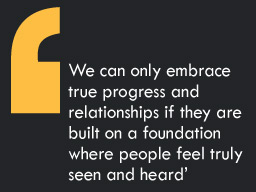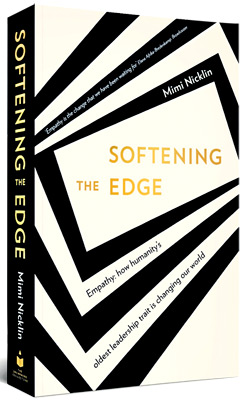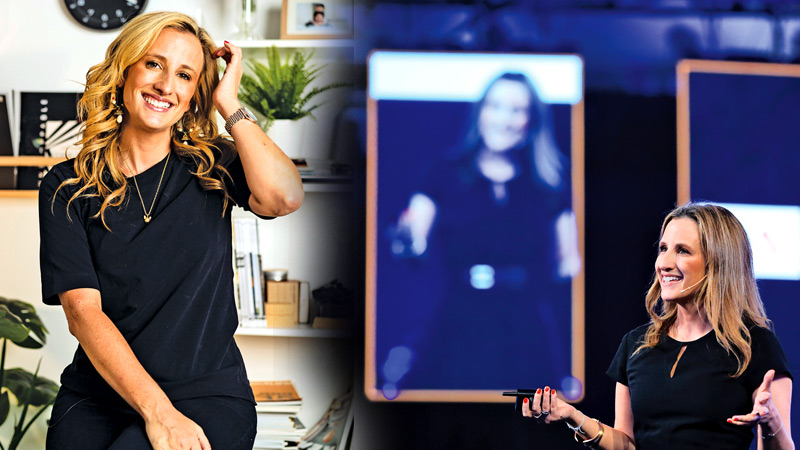In a world where traditional leadership styles are increasingly being challenged, Mimi Nicklin emerges as a transformative figure at the forefront of a global movement advocating for empathy in the workplace.
 An internationally bestselling author of “Softening The Edge,” Mimi is not only the founder of Empathy Everywhere, the world’s widest-reaching organizational empathy platform, but also a organizational consultant and coach.
An internationally bestselling author of “Softening The Edge,” Mimi is not only the founder of Empathy Everywhere, the world’s widest-reaching organizational empathy platform, but also a organizational consultant and coach.
During her recent visit to Sri Lanka, she shared her insights with the ‘Youth Observer’, shedding light on how empathetic leadership is crucial for fostering effective communication, enhancing multigenerational engagement, and navigating the complexities of modern organizational life.
 In this enlightening interview, Mimi discusses her journey, the importance of listening-led leadership, and her strategies for helping organizations implement empathetic practices.
In this enlightening interview, Mimi discusses her journey, the importance of listening-led leadership, and her strategies for helping organizations implement empathetic practices.
Q : What inspired you to found Empathy Everywhere, and how do you see it influencing the future of leadership and business culture?
A. My journey into leadership development was impacted by my own experience of low empathy organizations and the need for a new standard of leadership and profit delivery. This really began in a CEO role in Dubai and became my purpose work as my first book became a bestseller globally and my podcast reached nearly 100,000 people in a few months. I believe that the future of all leadership lies in connected leadership, or what I call Listening-Led Leadership. In today’s world where we see multiple generations within one organization, the need for understanding has never been higher. The younger generations will demand this as they grow and the older generations will need this as they move into a new stage of their career within an ageist world. As we face an attrition crisis Sri Lanka wide, employee loyalty is based on their ability to feel belonging and connection in their roles beyond their contractual obligations. Every data point we have proves the power of empathy across all business drivers, from performance to motivation, morale, output, tenure, and loyalty. Profit for example has been shown to increase up to 23% and effectiveness over 17% (Gallup Data.) Listening-Led Leadership is changing the face of leadership. You listen or you lose out, it’s as simple as that.
Q: With your background as an organizational consultant and coach, how do you approach training Fortune 500 organizations in empathetic leadership, effective communication, and conflict management?
A. The ability to effectively listen to your teams, to be present, and to acknowledge the teams around you is a superpower and point of difference. Very few leaders have mastered the art of true listening, yet within this skill set lies the secret to deep, long standing relationships and trust. My master classes and workshops focus on developing these skills – emotional intelligence, communication and dialogue creation – as well as overcoming conflict and driving diversity and inclusion. The capacity to recognise the power of ‘pausing’ and engaging with employees is the skill set that separates out the top from the middle when it comes to leadership. Always ask yourself “Am I listening to reply or am I listening to respond?” If the answer is the latter, it’s time to reassess. I also believe deeply in the power of mentorship. Mentorship is not about giving advice or fixing problems, but it is about having someone who listens to you without judgment and without considering the need to agree or disagree. A mentor is there simply to hear you actively and be able to understand your perspective and globally CEO’s are searching out this coveted skillset to aid them in achieving their goals.
Q: How do you balance the values of humanism and capitalism in the workplace, and what strategies do you recommend for achieving a harmonious blend of the two?
A. An effective work environment promotes employee satisfaction and morale – as a direct driver of productivity, performance, and retention. Employees who feel appreciated, valued, and supported are proven to be more effective in their roles, more loyal to their organizations and more able to take risks, create strategies and build client relationships. When this form of organizational culture is created consistently we find more open communication and collaboration which directly impacts outcomes and output. Employees that feel heard are 33% more effective at delivering on their KPI’s (Gallup.) Trust, respect, and dialogue create an environment where teamwork and creativity flourish and lead to better results. We can only embrace true progress and relationships if they are built on a foundation where people feel truly seen and heard. This is an evolutionary human requirement.
Q: Your book ‘Softening the Edge’ emphasizes the role of organizational understanding in enterprise culture. Can you elaborate on the key principles discussed in your book and how they are applied in your work with corporates today?
A. In 2022 and 2023 the book sold out across our island and has continued to sell well to organizations in Sri Lanka today. The key principles revolve around the importance of empathetic (Listening Led) communication, leadership and organizational culture. The book unpacks the role of regenerative leadership, which focuses on driving teams and fostering continuous improvement, and helps leaders assess how to address the empathy deficit prevalent in many workplaces. I focus on highlighting the transformative power of communication and dialogue (and various facets of emotional intelligence) through real-life examples and case studies, demonstrating how it enhances communication, strengthens relationships, and improves organizational health and profit. In my work with corporates today, I conduct empathy workshops, consult on organizational culture redesign, provide leadership coaching, and advise on empathy-driven performance strategies. These efforts aim to create more inclusive, resilient, and successful organizations.
Q: As a keynote speaker and coach, how do you help organizations navigate generational gaps, enhance team engagement, and foster inclusivity through empathy and effective communication?
A. In today’s organizations, where multiple generations work side by side, improving multi generational understanding is crucial for mitigating disengagement, presenteeism, high attrition and disconnection. Empathetic leadership directly drives improvements in efficiency, learning, growth, talent retention, and overall employee engagement and ensures that all generations within the business are able to work cohesively. When leaders focus on listening to understand, they foster higher levels of innovation and commitment and as a keynote speaker and coach, I help teams embed these skillsets into culture and workplace communication programs.
Q: What motivated you to start your podcast shows, “The Empathy for Breakfast Show” and “Mimi YouYou”? How do you see podcasting as a platform for spreading awareness about empathy and connection?
A. I am very proud of my first podcast which reached 85,000 people, and my new podcast which is called the MimiYouYou Show – Empathy Stories which is growing at 800% a month, at number two in Sri Lanka. The MiMi YouYou Show’s vision is to help overcome the global Empathy Deficit by sharing untold or unheard stories. To teach, encourage and imbue empathy, simply by listening in. We give every listener the chance to practice and create empathy with and towards others, every time they join us. I’m incredibly proud that they continue to grow and deliver on that goal. Podcasting allows for the dissemination of empathy and connection in a format that is easily accessible and can reach a wide audience, making it an effective tool for spreading awareness and fostering a culture of empathy.
Q: How do you envision the future of leadership in the current turbulent times we are navigating, and what role do you see empathy playing in shaping that future?
A. I think the future of all leadership truly lies in empathetic leadership. After all, if you don’t understand your teams, how will you ever inspire them to reach their, or the organisations, potential? Globally, businesses are losing a staggering ‘one trillion dollars in productivity’ each year, according to the Gallup State of Workplace Report 2023, due to staff disengagement and low empathy in the workplace. Furthermore, nearly 80% of employees worldwide are actively disengaged in their work, despite efforts from companies to pay their way out of the problem. In Sri Lanka, while our part of this loss might be smaller, it could still be costing us up to USD 1,000,000 an hour in missed opportunities.
The future of leadership lies in recognising and nurturing human beings within the workplace; balancing humanism and capitalism. Leaders must be trained in conflict resolution, inclusive communication, and active listening to build collaborative environments that go beyond mere financial incentives. While increasing salaries might fix short-term issues, retaining loyal and motivated employees in the long run in our domestic market will require more than a financial fix. Investing in employee retention strategies that empathise with employee realities and that are centered around meaningful engagement and value alignment, is crucial. Without these in place, your competitors will lure away your talent before you revise their pay check.






